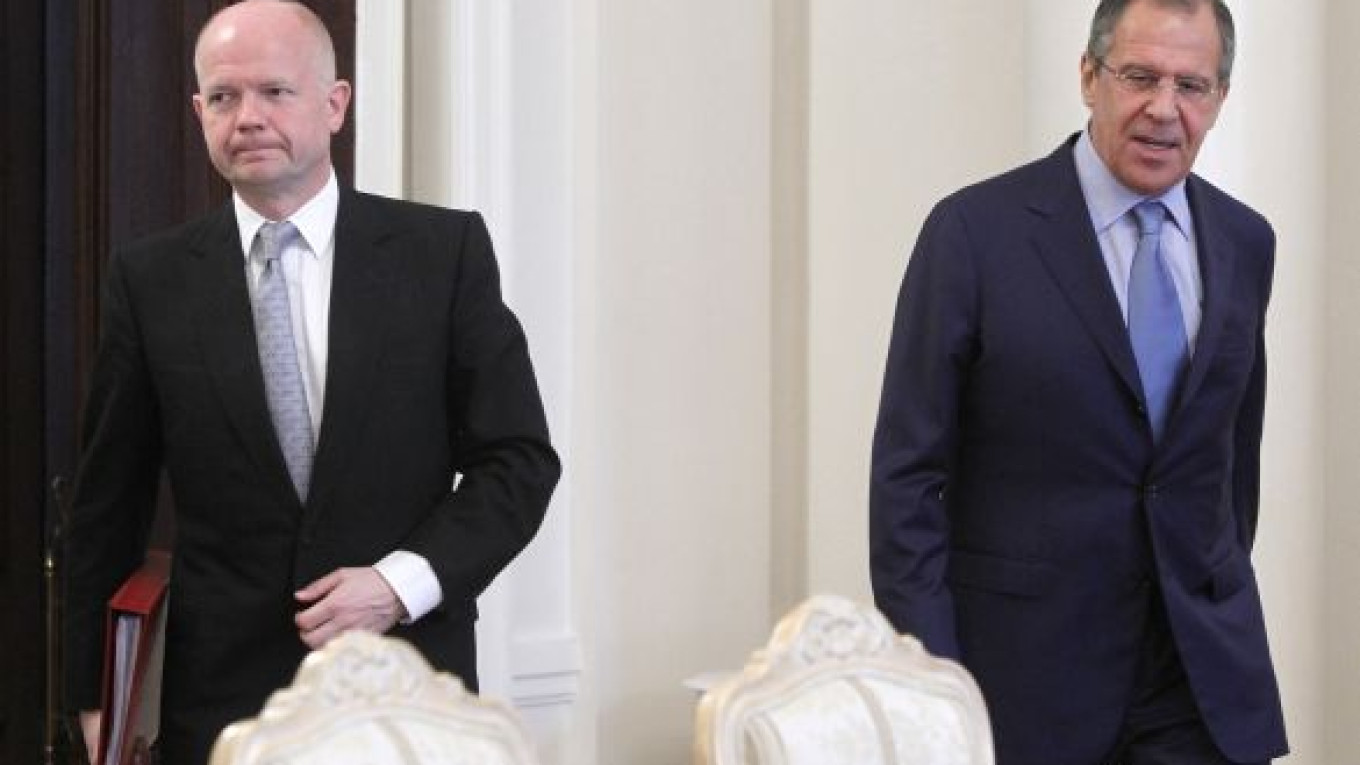British Foreign Secretary William Hague on Monday became the first senior Western official to hold with the new Russian government, in what analysts labeled an initiative to prevent further deterioration of relations.
Hague discussed the Syria crisis and the upcoming Olympic Games in London and Sochi with Foreign Minister Sergei Lavrov before holding more Olympic-related talks in the White House, the British Embassy said.
London has sought to improve ties with Moscow, long frayed by the poisoning death of former Federal Security Service officer Alexander Litvinenko in London and demands from both sides to extradite suspects from Moscow and self-exiled Kremlin critics from Britain.
The talks on Syria went relatively smoothly, with Lavrov hinting that Moscow could increase pressure on Syrian President Bashar Assad to abide by the peace plan forwarded by United Nations and Arab League envoy Kofi Annan.
"Of course we are deeply worried that this plan is fulfilled in an unsatisfactory way," Lavrov told a joint press conference with Hague, Interfax reported.
Lavrov also said he agreed with his British counterpart that leading states should make additional efforts to implement Annan's plan. "We will work on this in the near future," he said.
Hague said he and Lavrov agreed that the Annan plan was "the only hope for Syria to try to break the cycle of violence" and that London "will work closely with Russia in overseeing its implementation," according to a transcript on the British Embassy website.
Russia has staunchly supported Assad in his 14-month assault on a pro-democracy opposition determined to oust him.
Lavrov reiterated Monday that Moscow was not taking sides, saying that both government and opposition forces were to blame for a massacre Friday in the town of Houla that killed more than 100 people.
The foreign minister also criticized Arab countries' argument that only regime change could solve the crisis by saying that this "raises doubts that they want to stop the violence."
Observers said the talks offered an important signal because much of the Kremlin's foreign policy is in limbo following the May 7 handover of the presidency from Dmitry Medvedev to Vladimir Putin.
"It's good that it went without confrontation," said Vladislav Belov of the Moscow State International Relations Institute, adding that Syria is a vital element of relations with the West.
Putin will make the first foreign visit of his new term Thursday, when he heads to Belarus. That will be followed by short trips to Paris and Berlin on Friday.
The president will hold his first high-level talks inside the country Monday, when he hosts a summit with the European Union's leadership in St. Petersburg.
The fact that afterward Putin is slated to visit the Uzbek capital, Tashkent, and then Beijing has prompted speculation that his foreign policy will give more attention to relations with Moscow's allies in Asia than with the West.
Edward Burke of the Center for European Reform, a London-based think tank, said Britain was concerned about worsening ties after Putin's return to the Kremlin.
"Hague is a pragmatist. … He does not like microphone diplomacy," Burke said.
Burke added that these worries have grown since Putin canceled his visit to the Group of Eight summit earlier this month, "which sent a message that he is upset with the U.K. and the U.S."
Putin instead sent Prime Minister Dmitry Medvedev to the U.S.-hosted summit at Camp David on May 18 and 19, explaining that he was too busy with forming the government.
But the British Embassy denied that Hague's visit was prompted by such concerns, saying that it had been planned for a long time.
"It had been in the making since Prime Minister David Cameron's visit" in September, an embassy spokesman said on customary condition of anonymity.
The spokesman also stressed the Olympic-related agenda, which included talks with Deputy Prime Minister Dmitry Kozak, Sports Minister Vitaly Mutko and the president of the organizing committee for the 2014 Winter Olympics in Sochi, Dmitry Chernyshenko.
"They discussed cooperation on the Olympics and the lessons for Sochi," he said.
Asked whether Hague had issued any formal invitation to Russian leaders, the spokesman merely said that "there is a warm invitation to all Russians to visit the London games."
The issue made headlines over the weekend when jailed tycoon Mikhail Khodorkovsky suggested in a written interview with the Sunday Telegraph that London ban certain Russian officials from visiting Britain for the Olympics.
The selected officials are on a list compiled by opposition figure Garry Kasparov
Khodorkovsky's lawyers subsequently denied Russian media reports that their client had come up with his own list of officials to be banned.
A Message from The Moscow Times:
Dear readers,
We are facing unprecedented challenges. Russia's Prosecutor General's Office has designated The Moscow Times as an "undesirable" organization, criminalizing our work and putting our staff at risk of prosecution. This follows our earlier unjust labeling as a "foreign agent."
These actions are direct attempts to silence independent journalism in Russia. The authorities claim our work "discredits the decisions of the Russian leadership." We see things differently: we strive to provide accurate, unbiased reporting on Russia.
We, the journalists of The Moscow Times, refuse to be silenced. But to continue our work, we need your help.
Your support, no matter how small, makes a world of difference. If you can, please support us monthly starting from just $2. It's quick to set up, and every contribution makes a significant impact.
By supporting The Moscow Times, you're defending open, independent journalism in the face of repression. Thank you for standing with us.
Remind me later.


